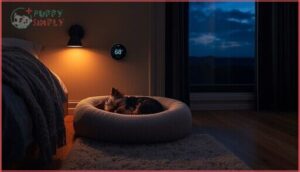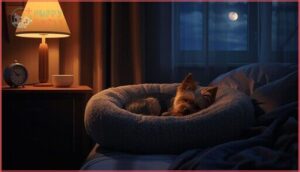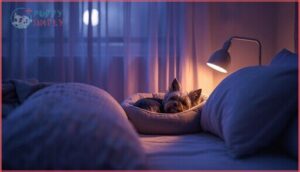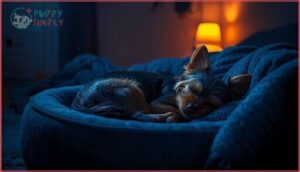This site is supported by our readers. We may earn a commission, at no cost to you, if you purchase through links.

Your Yorkie puppy wakes you up three times between midnight and 5 a.m., and you’re starting to wonder if a full night’s rest is even possible. Most Yorkie owners face this exhausting reality during the first few months, but here’s what brings relief: the majority of Yorkies begin sleeping through the night between 4 and 6 months of age, once their bladder control matures and they’ve adapted to a consistent routine.
The timeline varies based on factors like your pup’s age, health, daily activity level, and the sleep environment you’ve created. Understanding your Yorkie’s sleep patterns and implementing the right training strategies can help you both get the rest you need sooner rather than later.
Table Of Contents
- Key Takeaways
- Yorkie Puppy Sleep Patterns
- When Yorkies Start Sleeping Through The Night
- Factors Affecting Yorkie Nighttime Sleep
- Common Sleep Problems in Yorkies
- Creating a Comfortable Sleep Environment
- Establishing a Bedtime Routine for Yorkies
- Training Your Yorkie to Sleep Through The Night
- Managing Separation Anxiety at Night
- Top 4 Sleep Products for Yorkies
- When to Seek Veterinary Help for Sleep Issues
- Frequently Asked Questions (FAQs)
- What are some natural remedies to help a Yorkie sleep through the night?
- How can I address my Yorkie’s anxiety-related sleep disturbances?
- Can Yorkies sleep with other pets safely?
- Do Yorkies dream during their sleep cycles?
- Should I leave lights on at night?
- How does spaying affect Yorkie sleep patterns?
- What sleeping positions are normal for Yorkies?
- Conclusion
Key Takeaways
- Most Yorkies sleep through the night between 4 and 6 months of age once their bladder control develops and they adapt to a consistent routine.
- Creating a comfortable sleep environment with proper bedding, ideal room temperature (64°F to 72°F), and minimal noise reduces nighttime disruptions by up to 55%.
- A structured bedtime routine including a final potty break within 30 to 60 minutes of sleep reduces overnight accidents by 42% and helps puppies achieve faster house training.
- Persistent sleep problems beyond the typical development window, sudden pattern changes, or signs of breathing issues warrant veterinary evaluation to rule out health conditions like sleep apnea or pain.
Yorkie Puppy Sleep Patterns
Understanding when and how Yorkie puppies sleep can take a little guesswork out of your daily routine. Their rest habits shift as they grow, often catching new owners by surprise.
Here’s what you can expect as your puppy gets used to life in your home.
Typical Daily Sleep Hours for Yorkie Puppies
Every Yorkie puppy is a powerhouse of growth, needing plenty of rest. Sleep duration ranges from 16 up to 22 hours a day at first—sometimes more than you might expect.
Puppy nap frequency is high, with rest scattered throughout the day and night. Your Yorkie puppy’s sleep schedule shifts with age, environment, and overall health affecting sleep.
Establishing a routine helps regulate Yorkie puppy sleep and aids learning.
Nighttime Sleep Vs. Daytime Naps
Understanding how Yorkie puppy sleep divides between day and night helps you manage expectations. Nighttime sleep duration may only reach 7 to 10 hours initially, while daytime naps add up to around 3.5 hours spread across multiple sessions.
Your puppy’s sleep schedule depends on several factors:
- Nighttime sleep gradually lengthens as bladder control improves
- Daytime naps remain frequent but shorter as puppies mature
- Environmental factors like noise interrupt lighter daytime rest more easily
- Activity impact before bedtime influences nighttime sleep quality
Sleep patterns shift constantly during early development. Yorkie puppies often experience extended sleep durations, sometimes sleeping up to 20 hours a day.
Changes in Sleep Needs as Puppies Grow
As your Yorkie puppy matures, sleep duration drops predictably—about an hour per month. Newborns need 16 to 22 hours daily, but by six months, expect closer to 14 to 16 hours.
Nap frequency changes too, shifting from five short bursts to two or three longer rest periods.
Environmental cues like household routines start shaping the puppy sleep schedule around 12 weeks, aligning sleep cycle patterns with yours.
When Yorkies Start Sleeping Through The Night
Most Yorkie puppies can sleep through the night consistently between 4 and 6 months of age. However, this timeline isn’t set in stone—some puppies achieve full-night sleep earlier, while others take a bit longer depending on their development and training.
Let’s look at what influences this achievement and how you’ll know your Yorkie is ready.
Average Age for Full-night Sleep
You’d be surprised how a sturdy bladder and steady routines work together. Generally, a Yorkie puppy starts sleeping through the night around 4 to 6 months old, clocking seven hours or more.
Watch for longer sleep duration, fewer early wake-ups, and your puppy following their sleep schedule—those are your surest signs of readiness in growing Yorkie puppies.
Developmental Milestones Affecting Sleep
While your Yorkie puppy grows, key moments shape the way sleep develops. Neonatal sleep patterns favor frequent naps, supporting rapid brain growth. Weaning impact brings brief disruptions as they adjust to new foods.
During the socialization phase, new sights and sounds demand restorative rest. Teething disruptions pop up, too. Over time, a polyphasic shift leads to longer, consolidated nighttime stretches—hallmarks of healthy puppy development.
Signs Your Yorkie is Ready
Although patience is key, you’ll notice your Yorkie puppy is showing readiness to sleep through the night when:
- The sleep area stays quiet as your puppy settles for six hours or longer.
- Bladder control remains stable, with fewer overnight wake-ups.
- Routine compliance improves, and owner reports, along with sleep-wake data, confirm your Yorkie’s sleep habits are maturing during development.
Factors Affecting Yorkie Nighttime Sleep
Several factors can shape how well your Yorkie sleeps at night. Some are tied to your dog’s age and health, while others depend on daily routines. Here’s what to keep in mind as you look for answers.
Age and Developmental Stage
Puppy sleep needs are sky-high, with Yorkie puppies clocking up to 22 hours a day.
Sleep milestones mark their journey—adolescent sleep shifts to 14–16 hours, while adult sleep patterns settle between 13–18 hours nightly.
As senior Yorkies age, sleep changes again, often slipping back to 14–18 hours, reflecting lower activity and the rhythm of growing older.
Health Conditions and Pain
Ever notice your Yorkie fidgeting at night? Many dog health issues—like chronic pain or joint health problems—disrupt sleep. Common conditions such as arthritis, tracheal collapse, or hormonal changes can all trigger sleep disorders. Watch for these behavioral signs:
- Restlessness and pacing
- Whimpering or vocalizing
- Unusual sleep arrangements
- Frequent waking
- Irritability at bedtime
Exercise and Daily Activity Level
Picture your Yorkie as a tiny engine that needs to burn just enough fuel each day. Balanced daily exercise for Yorkies—about 45 minutes, split into short activity routines—helps manage energy expenditure.
When your dog gets the right mix of physical and mental stimulation, sleep quality improves, and age variation is easy to address. Well-paced exercise encourages healthy Yorkie sleep habits.
Common Sleep Problems in Yorkies
Even Yorkies can have trouble getting a good night’s sleep. Certain problems like breathing issues or restlessness aren’t uncommon.
Here are some of the most common sleep challenges Yorkies might face.
Sleep Apnea and Breathing Issues
Sleep apnea isn’t just a human problem—it can strike your Yorkshire Terrier, too. Signs like loud snoring or pauses in breathing may point to hidden dog sleep problems.
Older Yorkies and those with collapsed trachea face higher risk factors, directly affecting sleep quality. If you notice these breathing types, prompt veterinary management is key for protecting your dog’s health and sleep.
Insomnia and Restless Sleep
Beyond breathing troubles, insomnia and restless sleep plague around 5–10% of Yorkies, often triggered by anxiety or environmental changes. You might notice your dog pacing, whimpering, or shifting locations constantly—signs reported in 60% of affected Yorkies. These sleep disorders disrupt sleep quality and leave your pup exhausted.
Calming techniques, consistent routines, and addressing underlying causes are key to prevention and treatment:
- Monitor for excessive nighttime movement or barking
- Maintain a predictable bedtime schedule
- Rule out pain or medical triggers with your vet
- Use calming scents or familiar items for comfort
Signs of Underlying Health Concerns
If your Yorkie’s sleep problems persist despite adjustments, lethargy signs paired with appetite changes or behavioral shifts deserve closer attention.
A dull coat condition, breathing issues during rest, or unexplained weight fluctuations often signal underlying Yorkie health concerns like hypothyroidism or heart disease.
Consult your veterinarian promptly—chronic dog health and sleep disruptions rarely resolve alone and may indicate serious health problems requiring treatment.
Creating a Comfortable Sleep Environment
Your Yorkie’s sleep environment plays a big role in whether they’ll settle down and stay asleep through the night. A few simple adjustments can make the difference between restless waking and solid rest.
Let’s look at the key factors that help create a space where your Yorkie feels safe and comfortable enough to sleep soundly.
Choosing The Right Bed or Crate
When selecting a dog bed or crate, prioritize proper sizing—18 to 22 inches for most Yorkies—to encourage security without undermining house-training.
Orthopedic beds with supportive memory foam improve sleep quality and joint health, especially as your Yorkie ages.
Choose bed materials with removable, washable covers for cleaning ease, and consider comfort enhancements like raised sides or moisture-resistant liners to support better health outcomes.
Ideal Room Temperature and Lighting
A comfortable bed, proper temperature regulation, and light sensitivity create the best sleeping environment. Keep the room between 64°F and 72°F since Yorkies lose heat quickly, especially puppies with underdeveloped temperature control. Dim lighting or darkness encourages melatonin release and deeper sleep cycles.
Practical guidelines for optimizing your Yorkie’s sleep environment:
- Monitor floor temperatures where your Yorkie sleeps, as they’re often cooler than ambient readings
- Use dim nightlights at 50 lux or below if your anxious Yorkie needs gentle illumination
- Make seasonal adjustments by repositioning beds away from drafty windows during winter months
- Consider age considerations—puppies under 8 weeks and senior Yorkies need extra temperature vigilance
- Install a thermostat to maintain consistent temperatures throughout the night for uninterrupted rest
Minimizing Noise and Distractions
Since household noises disrupt rest in 86% of dogs, creating a quiet environment becomes essential. Soundproof bedding or crate covers reduce ambient noise by up to 15 decibels. White noise machines lower startle responses by 43%, while calming music or nature sounds improve sleep duration by 28%.
Establish quiet hours, position your Yorkie’s bed away from high-traffic areas, and use environmental changes like closing windows during peak noise times.
Establishing a Bedtime Routine for Yorkies
A consistent bedtime routine helps your Yorkie understand when it’s time to wind down and sleep through the night. Dogs thrive on predictability, and a structured routine signals that bedtime is approaching.
Here are the key elements to include in your Yorkie’s nightly routine.
Setting a Consistent Bedtime
Just like your own sleep suffers with an erratic schedule, your Yorkie thrives when bedtime happens at the same time every night. Setting a consistent bedtime reduces nighttime restlessness by 55% and helps Yorkies fall asleep 40% faster.
Here’s how to establish a solid routine:
- Choose a prime window between 8:30 PM and 10:00 PM for best results
- Perform pre-bedtime activities at the same time nightly to signal sleep
- Expect 4–7 days of bedtime resistance when starting a new routine
- Use dim lighting and calming music 30 minutes before sleep to reduce stimulation
Last Potty Break Before Sleep
A pre-bedtime potty break is your strongest weapon against nighttime accidents. Taking your Yorkie out within 30 to 60 minutes of lights-out reduces overnight disruptions by 42% and helps puppies achieve 80% overnight dryness by 12 weeks.
| Timing Strategy | Impact | Best For |
|---|---|---|
| Water restriction 1–2 hours before bed | 44% fewer midnight trips | All ages |
| Exercise 2+ hours before final potty | 37% longer sleep duration | Active puppies |
| Immediate crating after last break | 3-month house training vs. 5-month | Puppies under 5 months |
| Consistent 10–11 PM timing | 62% reduction in accidents | Establishing routine |
Crate training paired with this routine shortens the path to sleeping through the night.
Calming Pre-bedtime Activities
Your Yorkie’s brain needs clear signals that it’s time to power down. A calming wind-down routine reduces nighttime anxiety by 18% and helps most dogs fall asleep faster.
Here are three techniques to incorporate into your routine:
- Gentle massage and quality time: Slow strokes down the face and circular ear rubs release endorphins, while quiet cuddling lowers behavioral arousal in the final 30 minutes before bed.
- Calming scents and sounds: Lavender diffusion and soft white noise improve sleep onset times for 70% of small breeds.
- Light evening activity: Brief puzzle toys or treat-finding games two hours before bedtime help regulate circadian rhythms without overstimulation.
Pair these calming techniques with your established bedtime routine and cozy environment for best results.
Training Your Yorkie to Sleep Through The Night
Training your Yorkie to sleep through the night takes patience and consistency, but it’s one of the most important steps you can take for both of you.
The right approach helps your dog feel secure and independent, reducing nighttime waking and anxiety.
Here are three proven techniques that work well for most Yorkies.
Crate Training Basics
Crate introduction works best when you start with the door open, allowing your puppy to explore freely. Feeding inside the crate builds positive associations quickly.
When your Yorkie whines, wait until they’re quiet before opening the door—this prevents reinforcing the behavior. Gradual increments in crate time help prevent distress.
Daytime practice sessions teach your puppy that the crate means safety and rest, not isolation.
Encouraging Independent Sleep
Your Yorkie won’t learn to sleep solo overnight—building that confidence takes patience and smart bed location choices. Start by placing their bed near yours, then gradually move it farther away over several nights.
Reward quiet time spent in their own space, balancing daytime exercise to reduce nighttime anxiety. Routine cues like dimming lights signal it’s time to settle independently without fuss.
Using Scents or Familiar Items for Comfort
Once your puppy settles into their own space, calming scents can support that progress. Lavender and chamomile sprays on comfortable bedding create a sleep environment that reduces separation anxiety naturally. Introduce familiar items—like a soft blanket with your scent—gradually during naps first. Keep it simple:
- Calming scents signal bedtime without overwhelming your Yorkie
- Familiar objects ease anxiety when you’re apart
- Routine implementation builds trust in their sleeping spot
Stick with pet-safe products and regular practical laundering to maintain effectiveness.
Managing Separation Anxiety at Night
Separation anxiety can turn bedtime into a battle for both you and your Yorkie. Your dog may whine, pace, or refuse to settle when left alone at night.
The good news is that you can help your Yorkie feel more secure with the right approach and a little patience.
Recognizing Signs of Separation Anxiety
Spotting separation anxiety starts with watching your Yorkie’s behavior when you leave. **Destructive behaviors
Spotting separation anxiety starts with watching your Yorkie’s behavior when you leave. Destructive behaviors like chewing furniture or scratching doors are common red flags. You might also notice vocalization types such as excessive barking or howling.
Physical symptoms include trembling, panting, or even vomiting in severe cases. These signs disrupt normal sleep habits and prevent your Yorkie from sleeping through the night peacefully.
Gradual Desensitization Techniques
Once you’ve identified **se
Once you’ve identified separation anxiety, you can start training your Yorkie to feel calm alone. Gradual desensitization works by exposing your dog to brief separations below their anxiety thresholds, then making incremental adjustments over weeks.
Success rates improve considerably when you maintain owner compliance with short, frequent sessions. Breed customization matters too—Yorkies respond well to gentle, reward-based approaches that respect their size and sensitivity during crate training.
Comfort Measures for Anxious Yorkies
Beyond desensitization, you’ll want to layer in comfort measures that directly ease anxiety. A safe space with comfortable bedding and calming sounds helps your Yorkshire Terrier self-soothe during nighttime separation anxiety.
Compression therapy, like a ThunderShirt, calms roughly 80% of anxious dogs. Routine comforts—consistent feeding times, familiar scents, gentle massage—pair well with calming aids such as pheromone diffusers or vet-approved supplements to promote relaxation and uninterrupted sleep.
Top 4 Sleep Products for Yorkies
The right sleep products can make a significant difference in helping your Yorkie rest comfortably through the night.
Quality beds and crates provide the support and security your dog needs for uninterrupted sleep. Here are four top-rated options that address common sleep challenges in Yorkies.
1. Diggs Revol Dog Crate Collapsible
The Diggs Revol Dog Crate offers three crate sizes suitable for Yorkies and larger breeds, with material safety meeting baby industry standards. Its portability ease shines through one-handed collapsing in under 60 seconds.
Entry flexibility includes three access points—front, side, and ceiling doors—helpful for Yorkie crate training.
Cleaning ease comes from the removable bottom tray, supporting your Yorkie puppy sleeping routine and tips to get a Yorkie puppy to sleep through the night.
2. Furhaven Snuggery Memory Top Pet Bed
The Furhaven Snuggery Memory Top Pet Bed combines memory foam comfort with a burrow design that appeals to Yorkies who love burrowing under covers. Size suitability stands out—available in 26-inch and 35-inch bases for small breeds.
Cleaning ease comes from the removable, machine-washable cover.
Customer feedback consistently praises the dog bed quality, with 4.5-star ratings highlighting joint support and enhancing comfort for Yorkies seeking secure, cave-like sleeping spaces.
3. Furhaven Memory Foam Dog Bed Blue
This dog bed’s value is defined by its certified orthopedic support, featuring CertiPUR-US foam paired with a durable polyester cover that withstood 50 rough swipes without damage. Memory foam benefits include joint pain relief and improved alignment for restful sleep.
The removable, machine-washable cover simplifies cleaning and maintenance, though you’ll need to spot-clean the foam itself.
Cooling gel options improve temperature performance, while competitive pricing makes increasing comfort for Yorkies accessible.
4. Barn Door Dog Crate End Table
This dual-purpose piece transforms your Yorkie sleep training setup by combining secure crate training with aesthetic integration as functional furniture. Space-saving design features sliding barn doors and ventilated sides, while material durability from solid wood or MDF ensures long-term use.
Secure latches prevent escapes, and removable trays offer cleaning ease to maintain a healthy dog sleeping environment that encourages Yorkie puppy sleep habits.
When to Seek Veterinary Help for Sleep Issues
Most sleep issues improve with patience and consistency, but some situations need a vet’s attention. Knowing when to pick up the phone can save your Yorkie from unnecessary discomfort and help you catch problems early.
Watch for these warning signs that it’s time to schedule an appointment.
Sudden Changes in Sleep Patterns
If your Yorkie’s sleeping habits shift suddenly, don’t brush it off. Underlying conditions like hypothyroidism, sleep apnea, or pain often trigger these changes before other symptoms appear. Behavioral disorders and environmental impact can also disrupt Yorkie sleep patterns.
Age-related shifts are common in seniors, but abrupt changes at any age warrant attention.
Veterinary protocols recommend evaluation if unusual dog behavior and sleep persist beyond 72 hours, as health problems frequently cause these disruptions.
Persistent Nighttime Waking
When your Yorkie wakes repeatedly despite training, it’s time for professional evaluation. About 41% of owners report their puppies wake at least twice nightly during the first three months, but persistent issues beyond this period signal deeper concerns.
Yorkie sleep disorders and managing separation anxiety require targeted intervention. Establishing a bedtime routine and addressing puppy waking frequency through proven methods shows intervention effectiveness—evening calming routines reduce waking events by 47%.
- Anxiety correlation: Yorkies with anxiety disorders are 2.3 times more likely to experience nighttime disruptions
- Environmental impact: Household noise triggers sleep interruptions in 29% of cases
- Daytime function: Fragmented sleep causes 23% more lethargy during waking hours
Health Checks for Chronic Sleep Disruptions
Beyond ongoing waking, chronic sleep problems demand thorough veterinary evaluation. Your veterinarian will assess activity level changes, review health issues like arthritis or dental pain, and may recommend a sleep study EEG to detect sleep disorders. Early diagnosis matters—cognitive decline link research shows dogs with fragmented sleep face three times higher risk of brain deterioration.
Chronic sleep problems in Yorkies demand veterinary evaluation—fragmented sleep triples the risk of cognitive decline
| Diagnostic Tool | What It Reveals |
|---|---|
| Physical exam | Pain sources, dental issues, arthritis |
| Bloodwork & neurological tests | Metabolic disorders, cognitive dysfunction |
| Sleep study EEG | Sleep quality, apnea, abnormal brain activity |
| Activity trackers | Sleep-wake patterns, nighttime restlessness |
| Behavior assessment | Anxiety, disorientation, CCDS symptoms |
Veterinary treatments range from pain management and anti-anxiety medications to breed-specific guidelines designed for Yorkies. Addressing canine health concerns early prevents long-term complications and restores quality rest.
Frequently Asked Questions (FAQs)
What are some natural remedies to help a Yorkie sleep through the night?
If your Yorkie struggles with nighttime restlessness, natural remedies like melatonin, chamomile, and lavender aromatherapy can help.
Calming music, gentle massage techniques, and consistent bedtime routines support healthier sleep habits naturally.
How can I address my Yorkie’s anxiety-related sleep disturbances?
Anxiety-related sleep problems respond well to pheromone diffusers, gradual desensitization, and consistent bedtime routines.
Mental stimulation before rest, quiet sleeping areas, and calming techniques for dogs address separation anxiety effectively in most cases.
Can Yorkies sleep with other pets safely?
Yes, Yorkies can safely sleep with other pets when introduced gradually and monitored carefully. Co-sleeping benefits include companionship, but injury risks, hygiene concerns, and behavioral impacts require separate beds and proper supervision.
Do Yorkies dream during their sleep cycles?
Think your Yorkie’s just “napping”? Those twitching paws and muffled barks during REM sleep stages reveal brain activity replaying memories from daily adventures—yes, Yorkies experience vivid dream content during their sleep cycles.
Should I leave lights on at night?
Most Yorkies sleep best in darkness, though puppies or anxious dogs may benefit from a dim, warm-toned nightlight.
Bright lights cause melatonin suppression and sleep disruption, so keep your sleeping environment dark for healthier sleep habits.
How does spaying affect Yorkie sleep patterns?
Like a car running on different fuel, spaying shifts hormone levels that can temporarily disrupt your Yorkie’s sleep patterns during post-op recovery. This may lead to sleep disruption and urinary incontinence while behavioral changes settle.
What sleeping positions are normal for Yorkies?
Most Yorkies sleep on their side when fully relaxed, though curling into a ball helps them stay warm.
The belly-up pose signals trust, while the lion’s pose indicates light rest with readiness to wake.
Conclusion
You’ve spent months preparing the perfect crate, bedtime routine, and calming environment—yet your Yorkie still decides 3 a.m. is playtime. The irony? Once you stop obsessing over when Yorkies sleep through the night, they usually do.
Most reach this point between 4 and 6 months with consistency, patience, and proper training.
If sleep problems persist beyond this window or your pup shows signs of distress, consult your veterinarian to rule out underlying health issues.



















